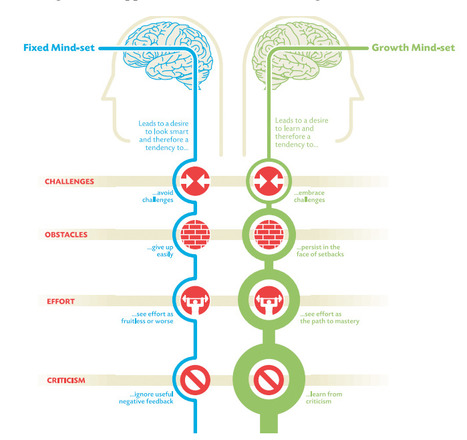 Your new post is loading...
 Your new post is loading...
Emotional intelligence is the prerequisite to great relationships. Here's how to teach kids to develop them. Step 1: To be happy and successful, they need to develop great relationships. Step 2: To develop those relationships, they need adequate emotional intelligence. Step 3: To develop emotional intelligence, it helps if their mentors (especially their parents) model good behavior in love and partnerships. 1. Teach them to "turn toward." Relationships are dynamic. They're made up of an uncountable number of small interactions. Julie and John Gottman, a husband and wife team of psychologists who are experts in this area, describe these interactions as "micro-behaviors" and "bids for attention."
Via The Learning Factor
What Your Brain Does When You're Criticised At any given time, brains are subconsciously scanning the world around us for dangers to defend against—ready to launch a fight, flight, or freeze response that will protect us from predators or poisons. But the brain doesn’t just guard us against physical threats. Research has found that it also goes on the defensive in response to things that threaten to undermine our social standing and safety, including interactions that make us feel even mildly rejected or incompetent. Since even being glanced at askance by a stranger can be enough to trigger our defenses, you can bet that receiving critical feedback is pretty likely to spark a fight, flight, or freeze response.
Via The Learning Factor
Most time-strapped executives know they should plan ahead and prioritize, focus on the important as much as the urgent, invest in their health (including getting enough sleep), make time for family and relationships, and limit (even if they don’t entirely avoid) mindless escapism. But doing this is easier said than done, as we all know—and as I, too, have learned during years of trying unsuccessfully to boost my effectiveness.
In my case, I stumbled upon an ancient meditation technique that, to my surprise, improved my mind’s ability to better resist the typical temptations that get in the way of developing productive and healthy habits. Much in the same way that intense, focused physical activity serves to energize and revitalize the body during the rest of the day, meditation is for me—and for the many other people who use it—like a mental aerobic exercise that declutters and detoxifies the mind to enhance its metabolic activity.
Via The Learning Factor, rodrick rajive lal
Belief change is a war of attrition. There's usually no one argument that can suddenly get someone to see the light. Changing someone's mind about a high-stakes position is a challenge many of us confront. Maybe your customers have preconceived ideas about your brand or products that you'd like to influence, or perhaps upper management is leaning toward a decision that you disagree with. In order to get someone to reconsider their views, it's important to understand the role of coherence in supporting beliefs. Going back to the 1950s, psychologists have recognized the interplay among different aspects of knowledge that influence our overall set of beliefs. Building off that research, the cognitive scientist Paul Thagard has more recently put forth the concept of "explanatory coherence."
Via The Learning Factor
Conviction in a leader is an incredibly valuable yet increasingly rare trait. It’s in short supply because our brains are wired to overreact to uncertainty with fear. As uncertainty increases, the brain shifts control over to the limbic system, the place where emotions, such as anxiety and panic, are generated. They’re relentlessly positive. Leaders with conviction see a brighter future with crystal clarity, and they have the energy and enthusiasm to ensure that everyone else can see it too. Their belief in the good is contagious. While this might look natural, leaders with conviction know how to turn on the positivity when the going gets tough. Positive thoughts quiet fear and irrational thinking by focusing the brain’s attention on something that is completely stress free. When things are going well and your mood is good, this is relatively easy; when you’re stressing over a tough decision and your mind is flooded with negative thoughts, this can be a challenge. Leaders with conviction hone this skill.
Via The Learning Factor
Being a leader can be a daunting task. Everyone on the team expects you to know the answer, and rarely can you go an entire day without having to make a critical decision. The toughest part is learning when to speak up, and when you to delegate to someone else. Finding the perfect balance is one of the toughest parts of leadership. For most first-time leaders, it seems that the default is to make a decision even if you don't know the answer. Unfortunately, when leaders approach the problem this way, it can lead to serious consequences. From my own experience, I've learned one of the most important parts of being a great leader is knowing when to keep your mouth shut. Below, I'll highlight three situations where as the leader you should not speak up, but shut up instead. Use these tips to keep your sanity, hold your team together, and be an effective leader.
Via The Learning Factor
What does it take to be a great leader? In a fascinating series of talks, business leaders, researchers, a famed general, and an orchestra conductor tackle that question from their diverse viewpoints. Some of their answers will surprise you. Here are seven of their best lessons.
Via The Learning Factor
Have you ever noticed that some individuals seem to “own the room” the moment they enter it? Even before he says something, even if nobody knows her, the room goes quiet. Everyone immediately senses “this is the leader.” Conventional wisdom says that if you “dress for success” you’ll have more confidence and other people will sense that. However, if all that’s giving you confident is your suit, you’ll come off like a wimp who spends too much money on your wardrobe. It’s how you behave around others, not clothing, that makes people sense you’re the leader, according to Deborah H. Gruenfeld of Stanford University, whose work was recently cited in the New York Times.
Via The Learning Factor
You know that multitasking is a bad idea. You may even know that frequent multitasking shrinks your brain and lowers your IQ. But did you know that, far from saving you time, multitasking cuts your productivity by a whopping 40 percent? That frightening number comes from Devora Zack, CEO of Only Connect Consulting, and author most recently of Singletasking: Get More Done--One Thing at a Time. In fact, she notes, there's actually no such thing as multitasking. You may think you're taking part in a conference call, writing a report, and texting with your spouse all at the same time, but what your brain is actually doing is switching non-stop among these different activities. That's costing you both efficiency and brain cells. The problem is, like many things, multitasking may be bad for you but it feels really good. That's because as you switch from task to task, your brain reacts to the feeling of newness with a jolt of dopamine--the same brain chemical that causes heroin addiction. Fortunately, Zack says, you can get off the multitasking treadmill, and regain your efficiency, not to mention the IQ points you may have lost. Here's how.
Via The Learning Factor
We've all been in that brainstorming meeting: the one where you could hear a pin drop, and the white board of "great ideas" remains blank. It's awkward for participants and downright excruciating for the person leading the meeting. Psychologist Art Markman helps us figure out how to get people talking. Dear Tired. I sympathize. Nothing is more frustrating than wanting to get your group to generate great ideas and ending up with a room full of people staring at their shoes.
Via The Learning Factor
What they should be focused on instead is curiosity, leadership ability, culture fit, and lastly, whether people can actually do the job, Bock said. “That has been one of the keys to our growth, making sure we get the right people in from the beginning,” Bock said. “If you get that right, you hire amazing people, they’ll be fine, and they’ll do amazing things.” Google has learned along the way. In its early years, the company strongly considered where applicants went to school, going after top talent from big-name universities. Then it looked at the data. What Bock and his team found was that there was no relationship between where employees went to school and how those people actually performed in their jobs.
Via The Learning Factor
If you're a shaky public speaker, your next big presentation offers so many things to be worried about. There's conceiving of and planning your speech, practicing it, keeping your nerves in check, actually presenting it, and dealing with audience questions, as well as any memory lapses that might trip you up.
Via The Learning Factor
Consider the recent article, “Why Strategy Execution Unravels — and What to Do About It“ by Donald Sull, Rebecca Homkes, and Charles Sull, in the March 2015 issue of HBR. Articles like this are well meaning and all set out to overcome the shortfalls of “execution.” But they all fail, including this one, and for the same reason: you can’t prescribe a fix for something that you can’t describe. And no one can describe “strategy execution” in a way that does not conflict with “strategy.” Blaming poor execution for the failure of your “brilliant” strategy is a part of what I’ve termed “The Execution Trap” — how “brilliant” can your strategy really be if it wasn’t implementable?
Via The Learning Factor
|
The average person has 70,000 thoughts each day, and if you don’t learn to organize them, they have the potential to wreak havoc on your productivity. When you succumb to the flurry of thoughts running through your head, your mind becomes disorganized, and the more you ruminate on intrusive thoughts, the more power you give them. Most of our thoughts are just that—thoughts, not facts. When you find yourself believing the negative, distracting, and pessimistic things your inner voice says, it’s very hard to slow down the momentum of your thoughts.
Via The Learning Factor
Why do people complain? Not to torture others with their negativity, surely. When most of us indulge in a bit of a moan, the idea is to "vent." By getting our emotions out, we reason, we'll feel better. But science suggests there are a few serious flaws in that reasoning. One, not only does expressing negativity tend not to make us feel better, it's also catching, making listeners feel worse. "People don't break wind in elevators more than they have to. Venting anger is...similar to emotional farting in a closed area. It sounds like a good idea, but it's dead wrong," psychologist Jeffrey Lohr, who has studied venting, memorably explained. OK, so complaining is bad for your mood and the mood of your friends and colleagues, but that's not all that's wrong with frequent negativity. Apparently, it's also bad for your brain and your health. Yes, really.
Via The Learning Factor
Most time-strapped executives know they should plan ahead and prioritize, focus on the important as much as the urgent, invest in their health (including getting enough sleep), make time for family and relationships, and limit (even if they don’t entirely avoid) mindless escapism. But doing this is easier said than done, as we all know—and as I, too, have learned during years of trying unsuccessfully to boost my effectiveness.
In my case, I stumbled upon an ancient meditation technique that, to my surprise, improved my mind’s ability to better resist the typical temptations that get in the way of developing productive and healthy habits. Much in the same way that intense, focused physical activity serves to energize and revitalize the body during the rest of the day, meditation is for me—and for the many other people who use it—like a mental aerobic exercise that declutters and detoxifies the mind to enhance its metabolic activity.
Via The Learning Factor
When it comes to success, it’s easy to think that people blessed with brains are inevitably going to leave the rest of us in the dust. But new research from Stanford University will change your mind (and your attitude). Psychologist Carol Dweck has spent her entire career studying attitude and performance, and her latest study shows that your attitude is a better predictor of your success than your IQ. Dweck found that people’s core attitudes fall into one of two categories: a fixed mindset or a growth mindset.
Via The Learning Factor
In every office, some employees carry a little more sway than others. Perhaps they’ve amassed enough political capital in the workplace to trade favors with colleagues and persuade supervisors to see things from their point of view. Maybe they can schmooze their way through a sales negotiation or exploit relationships with support staff to smooth the progress of a budget meeting. Recently, some research has suggested that employees who exhibit this type of political proficiency in the workplace also perform better on the job. After all, if politically savvy employees can network more effectively and rally support across different factions of their department or company, it stands to reason that they also have the ability to exert more positive influence over firm-wide affairs.
Via The Learning Factor
Reframing a problem helps you see it as an opportunity, and Seelig offers three techniques for finding innovative solutions: 1. Rethink The Question Start by questioning the question you’re asking in the first place, says Seelig. "Your answer is baked into your question," she says.
Before you start brainstorming, Seelig suggests you start "frame-storming": brainstorming around the question you will pose to find solutions. For example, if you’re asking, "How should we plan a birthday party for David?" you’re assuming it’s a party. If you change your question to, "How can we make David’s day memorable?" or "How can we make David’s day special?" you will find different sets of solutions.
Via The Learning Factor
Sometimes, stress can seem like a full-time job. Many of us try to avoid it or, failing that, manage or mitigate it. But, Kelly McGonigal, a lecturer at Stanford University and author of The Upside of Stress, makes the case for embracing the stress in your life. "We have this story about stress that says when stress is present, there’s something wrong with me or something wrong with my life," she says. But the reality is that there’s no stress-free version of your life available to you—it’s always going to be there. Often, the reason we have stress in our lives is because we’re leading rich lives and something we care about is at stake, she says. Constantly avoiding or reducing stress could mean not striving for certain goals or taking risks that could lead to great rewards, such as a new job or relationship. Instead, McGonigal advocates changing our attitudes about stress and embracing it. That’s easier said than done, but following several steps can help.
Via The Learning Factor
Many business leaders subscribe to the classic definition of strategy as a set of actions designed to achieve an overall aim. In other words, they believe strategy starts with a goal. But for companies that have implemented winning strategies, that’s not how it typically happens.
Via The Learning Factor
One of the big questions in business is this: Are great leaders born that way, or do they practice a set of habits that anyone can learn and practice? The current thinking is that leadership is a set of habits that can be learned by anyone. The more consistent you are in living and applying these habits, the better leader you will become. There are plenty of possible habits you can adopt to become a great leader, but here are 9 that will get you far along your own personal leadership journey.
Via The Learning Factor
Is getting an MBA worth it? It's a fraught question with passionately argued cases on both sides of the debate. But whether you think a stint at a top-tier business school is overpriced and creativity dulling or a golden ticket to success, everyone would have to agree that getting the knowledge of an MBA without the huge price tag or two-year time commitment is a great deal. Which makes a recent Medium post by Ellen Chisa a must read who for anyone who is unlikely to make it over to Boston to attend HBS any time soon. A current student, Chisa generously walks readers through the ten courses every first-year MBA student must take and reveals the most mind-blowing insight she took away from each. Some of her course descriptions will be of interest only to those in certain industries or roles, while others resist summarizing (but are still well worth a read in full). Here, however, are those that can be boiled down for entrepreneurs, along with several case studies (purchase required) that Chisa recommends if you want to do further reading. .
Via The Learning Factor
How many goals have you set in your life? A hundred? Ten thousand? Even more? How many of these goals have you actually achieved? If you're like most people, this second number is going to be a fraction of the first. A big reason is that as soon as you set a goal, three things emerge to stop you. But most of us don't even realize what they are, and as a result, we are just left with our unaccomplished goal and an unshakable feeling of failure. What if you could not only identify these obstacles but also learn to welcome them? Well, the good new is that you can....
Via The Learning Factor
When emotional intelligence (EQ) first appeared to the masses, it served as the missing link in a peculiar finding: people with average IQs outperform those with the highest IQs 70 percent of the time. This anomaly threw a massive wrench into the broadly held assumption that IQ was the sole source of success. Decades of research now point to emotional intelligence as being the critical factor that sets star performers apart from the rest of the pack. The connection is so strong that 90 percent of top performers have high emotional intelligence. Emotional intelligence is the "something" in each of us that is a bit intangible. It affects how we manage behavior, navigate social complexities, and make personal decisions to achieve positive results.
Via The Learning Factor
|



 Your new post is loading...
Your new post is loading...

























































We all want our kids to be happy and successful, so it makes sense to work backward and figure out how to make that happen.